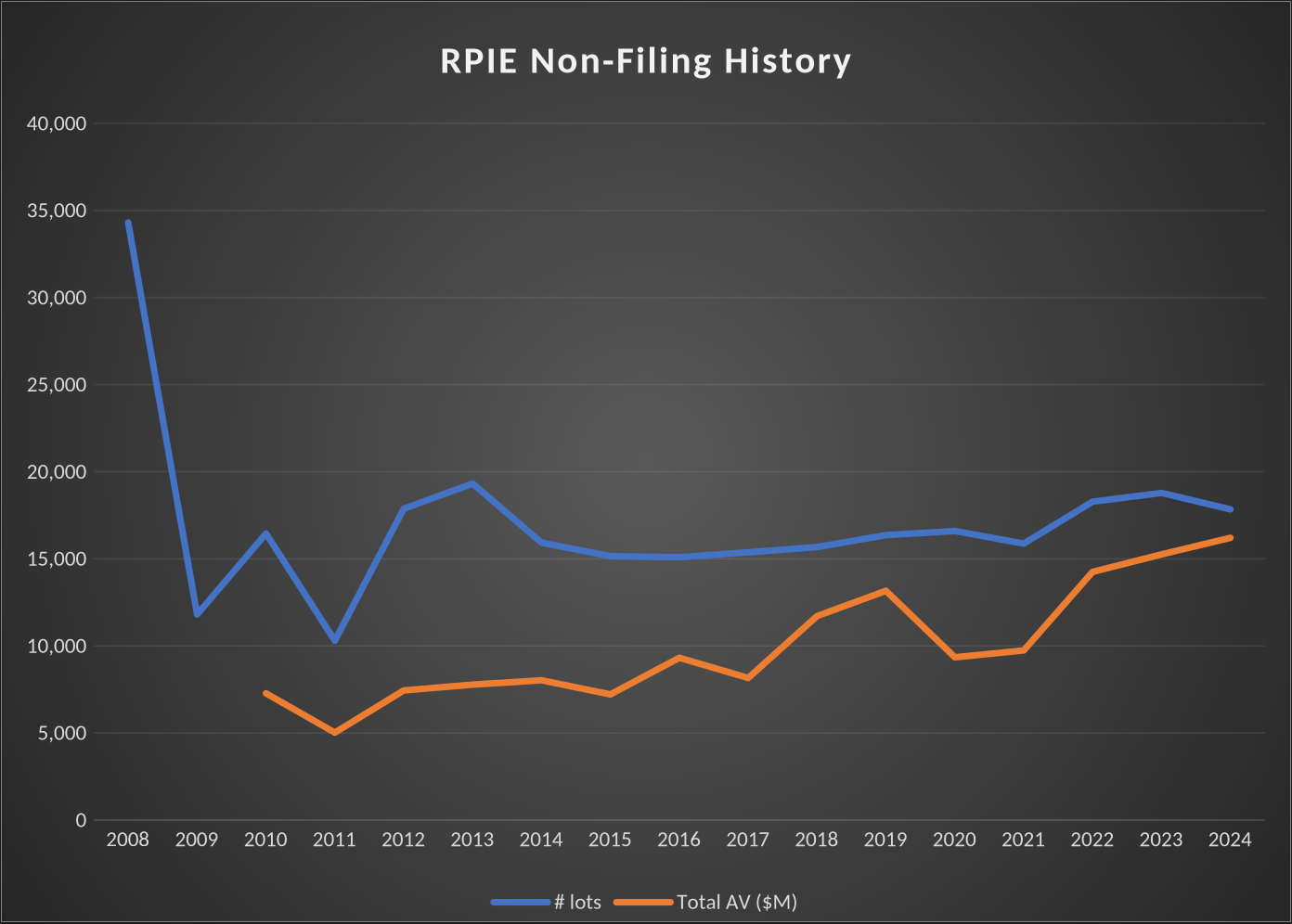NYC Property Tax

How to Avoid RPIE-2024 Non-Filing Penalties
Published 7/15/2025 at 5:37 PM
By: Benjamin M. Williams
The NYC Department of Finance (DOF) published its RPIE-2024 non-compliance list in early to mid-July 2025, identifying 17,851 tax lots across the five boroughs that failed to submit a properly completed Real Property Income and Expense (RPIE) statement for 2024. This represents a 2.4% decrease from the previous year’s 10-year record high of 18,794 tax lots. However, the total assessed value of these properties reached a record high of $16.216 billion, marking a 14% increase from last year.

Why You Should File the RPIE
The RPIE filing requirement enables property owners to report their previous year’s income and expenses. DOF uses this 2024 data in its Computer-Assisted Mass Appraisal (CAMA) system to set property values for the 2026/27 tax year, based on the property’s value and condition as of January 5, 2026.
Common Reasons Owners Fail to File
Two primary misunderstandings commonly lead to missed filings:
-
Property Was Vacant or Unrented
Even if your property generated no income in 2024, you must file an RPIE and explicitly claim the appropriate exclusion in Section D. -
Recent Property Purchase Without Full-Year Data
If you acquired your property in 2024 or 2025 and lack complete income and expense data, you must still file and claim the relevant exclusion in Section D.
Penalties for Non-Filing
Failing to submit the RPIE on time results in two major penalties:
-
Monetary Penalties: Property owners identified as non-compliant typically receive a notice from DOF in July, granting 30 days to file RPIE-2024 late and avoid financial penalties. After three consecutive years of non-filing, penalties dramatically increase to 5% of the property’s assessed value. Detailed penalty information can be found on DOF’s website.
-
Denial of Tax Commission Hearing: If you fail to file, you lose the right to a Tax Commission hearing for the following year (2026). While you can still protest the assessment, timely filing of RPIE-2025, your 2026 Tax Commission application (due March 1, 2026), and Supreme Court petition (due October 24, 2026) will allow a two-year Tax Commission review in 2027, covering tax years 2026/27 and 2027/28. We have helped many owners through this situation.
Retroactive Filing Not Allowed
RPIE-2023 filings and earlier are closed. Currently, only RPIE-2024 filings are available.
No “Reasonable Cause” Exceptions
DOF does not accept penalty waivers for reasons such as oversight, forgetfulness, or lost documents. However, with valid justification, experienced professionals can often help property owners reduce penalties. We have helped many owners reduce their RPIE non-filing fines.
Appealing an RPIE Penalty
Owners who receive a Final Determination imposing an RPIE penalty can challenge it through an Article 78 proceeding under the New York Civil Practice Law and Rules. Such actions must be initiated within four months of receiving the Final Determination.
Impacts on Property Tax Benefits
Non-compliance risks eligibility for important property tax benefit programs, including the Industrial & Commercial Abatement Program (ICAP), exemptions, and abatements.
Important Advice for Property Buyers
Prospective and recent property buyers should immediately check the RPIE-2024 non-compliance list. Under NYC Rules §33-03(a)(7), innocent purchasers – those acquiring property between the RPIE deadline and the publication of the non-compliance list or issuance of the first tax bill reflecting penalties – can request penalty waivers. Such requests must be submitted within 120 days following whichever of these events occurs later.
Proactive compliance is crucial to avoiding penalties and protecting your property tax appeal rights.
I wrote about this topic last year, see: RPIE-2023 Non-Compliance – file by August 21, 2024 | Rosenberg & Estis, P.C.
*Disclaimer: This post is for informational purposes only and does not constitute legal advice. Readers should consult qualified counsel regarding their specific circumstances. *Prior results do not guarantee a similar outcome.